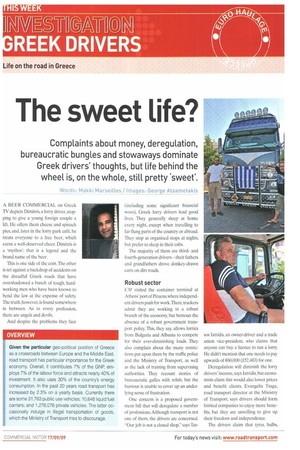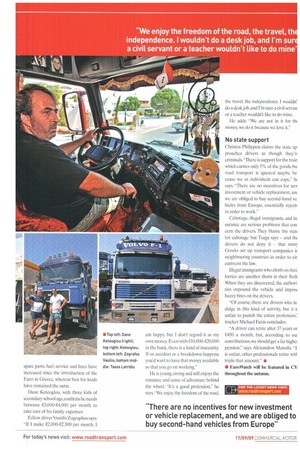The sweet life?
Page 20

Page 21

If you've noticed an error in this article please click here to report it so we can fix it.
Complaints about money, deregulation, bureaucratic bungles and stowaways dominate Greek drivers thoughts, but life behind the wheel is, on the whole, still pretty 'sweet'.
Words: Makki Marseaies I images: beorge Atsametaius
A BEER COMMERCIAL on Greek TV depicts Dimitris, a lorry driver, stopping to give a young foreign couple a lift. He offers them cheese and spinach pies, and, later in the lorry park café, he treats everyone to a free beer, which earns a well-deserved cheer. Dimitris is a 'mythos'; that is a legend and the brand name of the beer.
This is one side of the coin. The other is set against a backdrop of accidents on the dreadful Greek roads that have overshadowed a bunch of tough, hardworking men who have been known to bend the law at the expense of safety. The truth, however, is found somewhere in between. As in every profession, there are angels and devils.
And despite the problems they face (including some significant financial woes). Greek lorry drivers lead good lives. They generally sleep at home every night, except when travelling to far-flung parts of the country or abroad. They stop at organised stops at nights, but prefer to sleep in their cabs.
The majority of them are thirdand fourth-generation drivers — their fathers and grandfathers drove donkey-drawn carts on dirt roads.
Robust sector CM visited the container terminal at Athens' port of Piraeus, where independent drivers push for work.There, truckers admit they are working in a robust branch of the economy, but bemoan the absence of a robust government transport policy. This, they say, allows lorries from Bulgaria and Albania to compete for their ever-diminishing loads. They also complain about the many restrictions put upon them by the traffic police and the Ministry of Transport, as well as the lack of training from supervising authorities. They recount stories of bureaucratic gaffes with relish, hut the humour is unable to cover up an underlying sense of frustration.
One concern is a proposed government bill that will deregulate a number of professions. Although transport is not one of them, the drivers are concerned. "Our job is not a closed shop." says Tas
sos Iatridis, an owner-driver and a trade union vice-president, who claims that anyone can buy a licence to run a lorry He didn't mention that one needs to pay upwards of €60.000 (£52,483) for one.
Deregulation will diminish the lorry drivers' income, says Iatridis, but economists claim this would also lower prices and benefit clients. Evangelia Tsaga, road transport director at the Ministry of Transport, says drivers should form limited companies to enjoy more benefits, but they are unwilling to give up their freedom and independence.
The drivers claim that tyres, bulbs, spare parts, fuel, service and fines have increased since the introduction of the Euro in Greece, whereas fees for loads have remained the same.
Dane Keteoglou, with three kids of secondary school age, confirms he needs between €3,000-€4,000 per month to take care of his family expenses.
Fellow driver Va.ssi I is Zographos says: "If I make €2,000-€2,500 per month, I am happy hut I don't regard it as my own money Even with €10,000-€20,000 in the bank, there is a kind of insecurity If an accident or a breakdown happens, you'd want to have that money available so that you go on working."
He is young, strong and still enjoys the romance and sense of adventure behind the wheel. -It's a good profession," he says. -We enjoy the freedom of the road, the travel, the independence. 1 wouldn' do a desk job, and I'm sure a civil servan or a teacher wouldn't like to do mine. He adds: -We are not in it for th( money, we do it because we love it."
No state support
Christos Phil i ppou claims the state ap proaches drivers as though they'n criminals. "There is support for the train which carries only 5% of the goods, hu road transport is ignored maybe be cause we as individuals can cope," tit says. "There are no incentives for nev investment or vehicle replacement, an we are obliged to buy second-hand ve hides from Europe, essentially reject in order to work."
Cabotage, illegal immigrants, and in surancc are serious problems that con cern the drivers. They blame the statt for cabotage but Tsaga says and th( drivers do not deny it that man! Greeks set up transport companies it neighbouring countries in order to cir cumvent the law.
Illegal immigrants who climb on thei lorries are another thorn in their flesh When they are discovered, the authori ties impound the vehicle and impost heavy fines on the drivers.
"Of course, there are drivers who in dulge in this kind of activity, but it unfair to punish the entire profession,' trucker Michael Fatsis concludes.
"A driver can retire after 37 years or €450 a month, but, according to ow contributions, we should get a far highei pension," says Alexandros Manolis, "1 is unfair, other professionals retire witl triple that amount." •
• EuroWatch will be featured in CV throughout the autumn.
FOR THE LATEST NEWS Vim
1—niontroadtranspart.com








































































































































